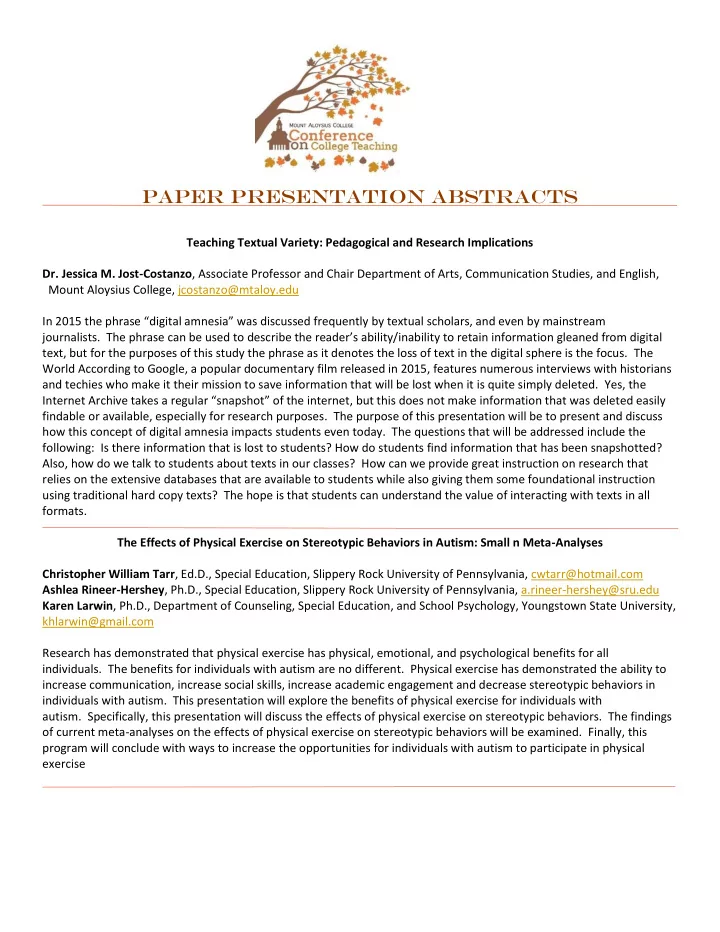

Paper Presentation Abstracts Teaching Textual Variety: Pedagogical and Research Implications Dr. Jessica M. Jost-Costanzo , Associate Professor and Chair Department of Arts, Communication Studies, and English, Mount Aloysius College, jcostanzo@mtaloy.edu In 2015 the phrase “digital amnesia” was discussed frequently by textual scholars, and even by mainstream journalists. The phrase can be used to describe the reader’s ability/inability to retain information gleaned from digital text, but for the purposes of this study the phrase as it denotes the loss of text in the digital sphere is the focus. The World According to Google, a popular documentary film released in 2015, features numerous interviews with historians and techies who make it their mission to save information that will be lost when it is quite simply deleted. Yes, the Internet Archive takes a regu lar “snapshot” of the internet, but this does not make information that was deleted easily findable or available, especially for research purposes. The purpose of this presentation will be to present and discuss how this concept of digital amnesia impacts students even today. The questions that will be addressed include the following: Is there information that is lost to students? How do students find information that has been snapshotted? Also, how do we talk to students about texts in our classes? How can we provide great instruction on research that relies on the extensive databases that are available to students while also giving them some foundational instruction using traditional hard copy texts? The hope is that students can understand the value of interacting with texts in all formats. The Effects of Physical Exercise on Stereotypic Behaviors in Autism: Small n Meta-Analyses Christopher William Tarr , Ed.D., Special Education, Slippery Rock University of Pennsylvania, cwtarr@hotmail.com Ashlea Rineer-Hershey , Ph.D., Special Education, Slippery Rock University of Pennsylvania, a.rineer-hershey@sru.edu Karen Larwin , Ph.D., Department of Counseling, Special Education, and School Psychology, Youngstown State University, khlarwin@gmail.com Research has demonstrated that physical exercise has physical, emotional, and psychological benefits for all individuals. The benefits for individuals with autism are no different. Physical exercise has demonstrated the ability to increase communication, increase social skills, increase academic engagement and decrease stereotypic behaviors in individuals with autism. This presentation will explore the benefits of physical exercise for individuals with autism. Specifically, this presentation will discuss the effects of physical exercise on stereotypic behaviors. The findings of current meta-analyses on the effects of physical exercise on stereotypic behaviors will be examined. Finally, this program will conclude with ways to increase the opportunities for individuals with autism to participate in physical exercise
Tranquility Gardens Promotional Campaign: Practical Application of Skills Developed by Students of Mt. Aloysius Dr. Tresa L. McVicker , Tranquility Gardens Executive Director, TLA23@hotmail.com Students of the Fall 2020 Practicum Course will share with conference participants the final project presentation that they have created through working with a local non-profit, Tranquility Gardens. Students will be able to demonstrate and discuss how they have applied skills garnered at Mt. Aloysius to support a non-profit dedicated to education and wellness. Tranquility Gardens Executive Director, Tresa McVicker, Ph.D. will provide feedback on working with students and products created from the collaboration. Benefits of Mentoring and Philosophy Mr. Stephen Purich , TLA23@hotmail.com Steven Purich, retired business owner and philanthropist, will share his personal story that lead him through hardships of childhood of wartime in Eastern Europe, to a young immigrant living in Johnstown, that ultimately became an industry leader in the top one percent of his field. He attributes his success to mentors and the philosophy he learned as a child. This presentation will engage participants to think differently about mentoring and philosophy while gaining insight and wisdom from a person that has both given and received mentor-ship and used philosophy for lifelong success. Student Directed Open Ended Oral Final Examinations Dr. Julie L Smith and Dr. Jodi Blubaugh, jsmith@mtaloy.edu Experimenting, prior to the COVID-19 outbreak, with students preparing and asking their own questions in a round-table format for final exam has demonstrated that with appropriate guidance in how to ask discussion oriented questions, that students ask more difficult questions than the instructor typically asks on a final. In addition, in holding each other accountable to the answers, students will probe answers and ask for support for assertions from each other. While initially concerned about civility and collegiality, the students have demonstrated a great ability to critically engage each other, their ideas, and the material in substantive ways in the courses I have used this in over the past seven years. Podcasting as a Resource For Teaching in a Pandemic Age Dr. Danny Paul Anderson, danderson@mtaloy.edu When the COVID-19 pandemic swept the world, educational institutions responded by swiftly moving to "remote learning" approaches to teaching. In the wake of this massive, lightning-fast shift, educators debated the merits and pitfalls of "synchronous" and "asynchronous" online learning approaches. That debate was frequently waged between the worlds of "traditional" and "online" pedagogy, with each camp imposing best practices from their respective ideological commitments. This paper will argue that pandemic-driven remote learning exists in an entirely separate space between traditional and online platforms. Furthermore, there currently exists a medium that fits nicely within this liminal space between pedagogical worlds: podcasting. Podcasting can be thought of a kind of extension of the older communication practice of blogging. Both are decentralized forms of publishing and communication that personalize the transfer of information and create small communities that emphasize conversation to a much greater degree than traditional, hierarchical publishing models. In short, podcasting employs a dialectical approach to inquiry that cultivates a community of learners and thinkers. In this way, the communicative practices of podcasting map quite neatly onto the pedagogical practices of the "traditional" classroom, which also centralizes dialogue as essential to active learning, all while existing in an "online," digital format that splits the difference between "synchronous" and "asynchronous"
Recommend
More recommend